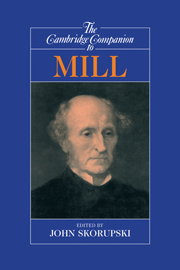Book contents
- Frontmatter
- Introduction
- 1 Mill on language and logic
- 2 Mill, mathematics, and the naturalist tradition
- 3 Mill on induction and scientific method
- 4 Mill, phenomenalism, and the self
- 5 Mill on religion
- 6 Mill on psychology and the moral sciences
- 7 Mill's utilitarianism
- 8 Mill's political economy
- 9 Civilization and culture as moral concepts
- 10 Democracy, socialism, and the working classes
- 11 The subjection of women
- 12 Mill and the Classical world
- 13 The reception and early reputation of Mill's political thought
- 14 Mill in a liberal landscape
- Guide to further reading
- Bibliography
- Index
8 - Mill's political economy
Ricardian science and liberal utilitarian art
Published online by Cambridge University Press: 28 May 2006
- Frontmatter
- Introduction
- 1 Mill on language and logic
- 2 Mill, mathematics, and the naturalist tradition
- 3 Mill on induction and scientific method
- 4 Mill, phenomenalism, and the self
- 5 Mill on religion
- 6 Mill on psychology and the moral sciences
- 7 Mill's utilitarianism
- 8 Mill's political economy
- 9 Civilization and culture as moral concepts
- 10 Democracy, socialism, and the working classes
- 11 The subjection of women
- 12 Mill and the Classical world
- 13 The reception and early reputation of Mill's political thought
- 14 Mill in a liberal landscape
- Guide to further reading
- Bibliography
- Index
Summary
A GRAND PROJECT
John Stuart Mill undertook to rehabilitate the utilitarian radicalism of Bentham and his followers, “to show that there was a Radical philosophy, better and more complete than Bentham's, while recognizing and incorporating all of Bentham's which is permanently valuable”. To carry out his grand project, he studied the insights into will, imagination, and character offered by German Idealists (including Goethe, Kant, and Schiller) and their British disciples (notably Coleridge, Frederick Maurice, John Sterling, and Carlyle). He was also far more open than his utilitarian predecessors to egalitarian social Utopias of the sort proposed by French 'socialists' (including Saint-Simon, Fourier, Comte, and Louis Blanc). Moreover, at his death in 1873, he was lampooned as a 'feminine philosopher' for his insistence that justice demanded equal rights for women as well as men independently of race or colour. In his view, as they gained equality with men, women would tend to demand more prudent family practices (including birth control measures) than had hitherto been observed or could otherwise be expected under the prevailing system of male domination.
Such psychological insights and improved ideas of society, Mill believed, could somehow be integrated with the basic tenets of the Benthamite approach. Bentham, James Mill, and Ricardo, whatever their other differences, analyzed political and economic affairs by assuming that any agent is motivated by his own particular interests as he conceives them. In addition to universal education, therefore, they generally advocated social institutions (including majoritarian democracy and competitive capitalism) designed to give predominantly self-interested individuals adequate incentives to act so as to promote the general happiness (understood as the sum or perhaps average of the enlightened self-interests).
- Type
- Chapter
- Information
- The Cambridge Companion to Mill , pp. 293 - 337Publisher: Cambridge University PressPrint publication year: 1998
- 16
- Cited by

